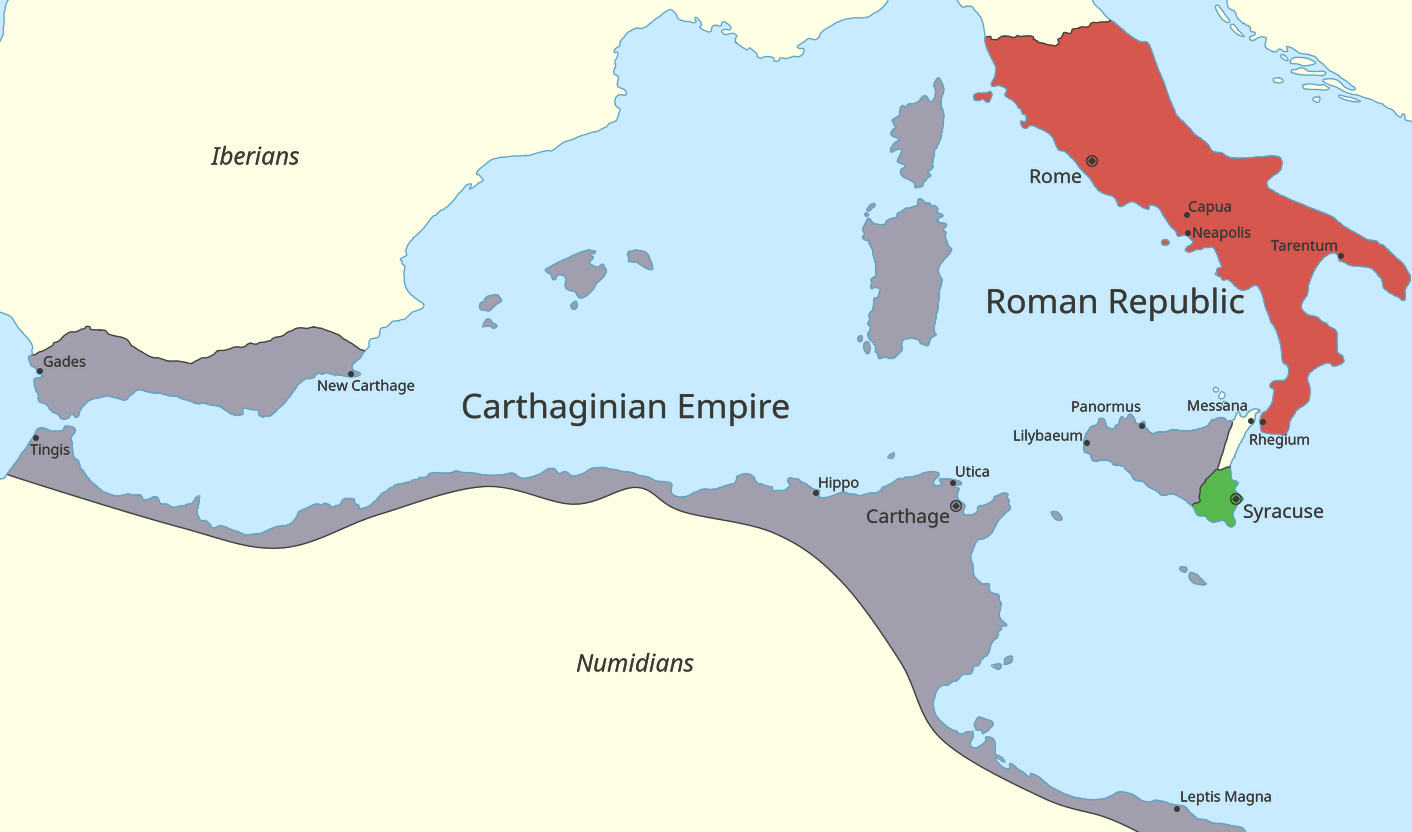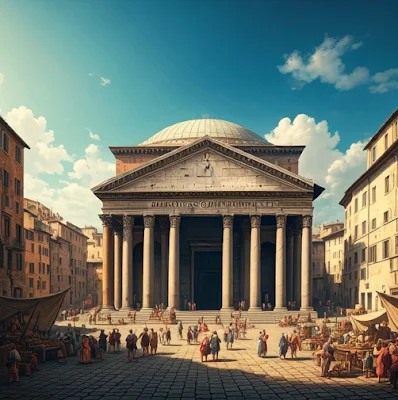Rome’s origins date back to 753 BC, where legend credits Romulus as its founder after the famous fratricidal conflict with his twin, Remus. Initially ruled by kings, the city transitioned into a republic in 509 BC, setting the stage for its territorial and political expansion. Rome's Republic thrived on a system of checks and balances, with power shared between consuls and the Senate. Rome's growing influence over Italy and beyond was fueled by a blend of military prowess, strategic diplomacy, and forged alliances.
Rome’s rise to Mediterranean dominance took a dramatic leap during the Punic Wars (264–146 BC), a series of battles against Carthage, a powerful city-state in North Africa. Figures like Hannibal Barca and Scipio Africanus shaped this conflict, which ended with Rome's destruction of Carthage in 146 BC, solidifying its control over the western Mediterranean and transitioning Rome from a regional force to an imperial giant.
 |
| Visual map of First Punic War during 264 BC Jon Platek, Besvo, CC BY-SA 3.0, via Wikimedia Commons |
What's the main reasons Rome won the Punic War?
Better military strategy, innovative tactics (utilizing surprise maneuvers and exploit enemy weaknesses), and effective naval reforms (improving ship designs for effective combat), coupled with leadership figures like Hannibal Barca and Scipio Africanus.
However, with expanded borders came internal strife. The late Republic was riddled with social unrest, corruption, and civil wars. One of the most pivotal figures of this era was Julius Caesar, a general whose conquests in Gaul and Britain elevated his status. His refusal to relinquish power led to his assassination in 44 BC, triggering further civil wars.
In the power struggle that followed, Caesar's adopted son, Octavian, emerged victorious, transforming Rome into an empire. In 27 BC, he became Rome’s first emperor under the title Augustus, bringing an end to the Republic. Augustus’ reign began the Pax Romana, a golden age of peace, stability, and prosperity, lasting over two centuries. Under Augustus and subsequent emperors, Rome expanded its territories, from Britain to Egypt, and from Spain to the Euphrates River.
What's the main reason that Octavian succeeded?
Octavian succeeded through strategic alliances, such as forming the Second Triumvirate with Mark Antony and Lepidus. His military prowess, notably defeating Antony at the Battle of Actium, and effective propaganda to portray himself as a champion of the Republic allowed him to consolidate power and become Rome's first emperor, Augustus
This period also witnessed remarkable advancements in architecture and engineering. The Romans built extensive roads, aqueducts, and iconic monuments like the Colosseum and Pantheon, displaying their mastery of construction techniques. Roman law, governance, and culture spread throughout the empire, leaving a lasting imprint on Western civilization.
Yet, Rome’s size eventually became a burden. By the 3rd century AD, it faced internal challenges such as economic decline, political chaos, and external invasions. Emperors rose and fell quickly, and civil wars became frequent. In a bid to restore order, Emperor Diocletian (r. 284–305 AD) divided the empire into eastern and western halves under a system known as the Tetrarchy, with separate rulers for each.
Despite these reforms, the Western Roman Empire weakened further throughout the 4th and 5th centuries. Barbarian groups like the Visigoths, Vandals, and Huns pushed into Roman territory, exploiting its fragility. In 410 AD, the Visigoths famously sacked Rome, signaling the empire’s increasing instability.
In 476 AD, the last Western Roman emperor, Romulus Augustulus, was overthrown by the Germanic leader Odoacer, an event often marked as the official fall of the Western Roman Empire and the start of the Middle Ages in Europe. Meanwhile, the Eastern Roman Empire, known as the Byzantine Empire, continued to flourish for nearly a millennium, preserving much of Rome’s heritage.
The significance of Rome extends far beyond its imperial conquests. Its contributions to law, governance, engineering, and architecture became the foundation of Western civilization. The Latin language evolved into the Romance languages still spoken today. Even after the fall of the Western Roman Empire, Rome’s cultural, political, and intellectual legacy shaped the world for centuries, leaving an indelible mark on history.
Analysis: Could Rome's downfall be prevented?
Rome’s decline could have been avoided with more effective and steady leadership that focused on reforming political corruption and social disparities. Emphasizing economic stability and managing resources wisely would have bolstered defenses against invaders. Building alliances with barbarian groups and promoting inclusive governance could have strengthened unity. By adapting to new challenges, the empire might have prolonged its survival and maintained its influence for a longer period.




Post a Comment